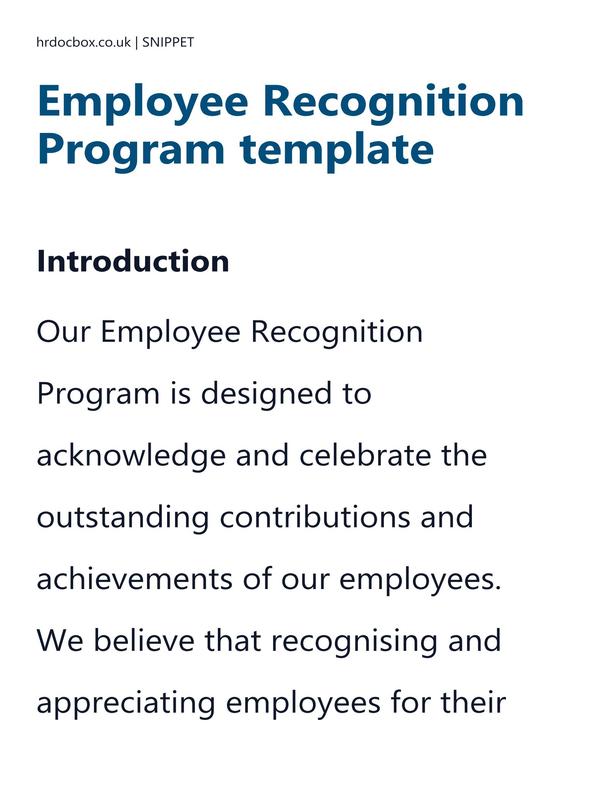Employee Recognition Program template


Our Employee Recognition Program boosts morale, motivates staff, and fosters a culture of appreciation and excellence.
- Includes Employee Recognition Program template, plus 12 months’ access with all updates provided free of charge and notified to you.
- UK-specific accuracy.
- 509 words over 2 pages.
- Last updated 14/02/2026.
- Format: Word / plain text / email.
- Delivery: Instant download after purchase (no physical item).
- Access: Download link shown here after checkout.
- This Employee Recognition Program template will SAVE you up to 1 hour 30 mins drafting & research. Save cost. Reduce risk.
Employee Recognition Program
Introduction
Our Employee Recognition Program is designed to acknowledge and celebrate the outstanding contributions and achievements of our employees. We believe that recognising and appreciating employees for their hard work and dedication is crucial for fostering a positive work culture and driving employee engagement.
Objectives
-
To motivate and inspire employees to excel in their roles.
-
To reinforce our organisational values and culture.
-
To enhance employee morale, job satisfaction, and retention.
-
To promote a culture of teamwork, collaboration, and mutual support.
Types of Recognition
-
Verbal Recognition: Managers and colleagues are encouraged to express appreciation and praise to employees for their accomplishments during team meetings, one-on-one conversations, or through email communication.
-
Written Recognition: Employees may receive written commendations or thank-you notes from their supervisors or peers, highlighting specific achievements and contributions.
-
Monetary Rewards: Outstanding performance may be rewarded
This is a 30% preview of the Employee Recognition Program template. For instant full access, purchase this item or a parent bundle.
Employee Recognition Program template purpose
The Employee Recognition Program aims to acknowledge and reward outstanding performance, dedication, and contributions of employees within the organisation. Through this program, employees are recognised for their hard work, achievements, and commitment to excellence, fostering a positive work culture and enhancing employee morale.
By celebrating successes and demonstrating appreciation for employees' efforts, the program helps to motivate and inspire individuals to continue delivering their best work.
Furthermore, the Employee Recognition Program serves as a tool for reinforcing desired behaviours and values within the organisation. By publicly recognising and rewarding employees who embody the company's core values and contribute to its success, the program helps to align employee actions with organisational goals and values. This fosters a sense of belonging and loyalty among employees, ultimately contributing to increased employee engagement, retention, and overall organisational performance.
Practical application of a Employee Recognition Program template
- The Employee Recognition Program template should be actioned / delivered as soon as reasonably practical.
Compliance
Compliance
This Employee Recognition Program template incorporates relevant UK laws and HR standards, including those listed below:
-
Employment Rights Act 1996: Establishes the legal framework for recognising and rewarding employees' contributions.
-
Equality Act 2010: Ensures that the recognition program does not discriminate against employees based on protected characteristics.
-
Data Protection Act 2018 (incorporating GDPR): Mandates the handling of personal data within the recognition program in compliance with data protection principles.
-
Acas Guidance on Employee Engagement: Offers best practice guidance on implementing recognition programs as part of broader employee engagement strategies.
-
CIPD Good Practice in Employee Recognition: Provides insights and best practices for designing and implementing effective employee recognition programs to motivate and retain talent.
Frequently Asked Questions about a Employee Recognition Program template
Frequently Asked Questions about a Employee Recognition Program template
-
Can I use the Employee Recognition Program template in my small business?
Yes. The Employee Recognition Program template is designed to be flexible and suitable for organisations of all sizes, including small businesses and charities. It follows UK employment law best practice, so even if you don't have an in-house HR team, you can confidently apply it.
-
Is the Employee Recognition Program template compliant with 2026 UK employment law?
Absolutely. Like the Employee Recognition Program template, all of our templates are drafted with the latest ACAS guidance and UK employment legislation in mind. We review and update them regularly, so you can be confident they remain compliant.
-
Can I customise the Employee Recognition Program template for my organisation?
Yes, we highlight the areas of the Employee Recognition Program template that you need to update with your own details, and where you need to make decisions to suit your situation. This saves you time and ensures that you meet best practice.
-
Do I get instant access to the Employee Recognition Program template?
Yes. Once purchased, you'll be able to download the Employee Recognition Program template instantly. Templates are provided in editable Word or Excel format so you can customise them easily, and in PDF format for easy sharing.
-
What if I need more help, not just a Employee Recognition Program template?
If you're looking for broader support, we also offer toolkits and library bundles that include the Employee Recognition Program template, along with other HR templates and policies for fully managing your situation. These may be more cost-effective if you need deeper advice.
-
Why should I use this Employee Recognition Program template, and not AI to generate it?
The risk of using a free AI-generated template 'without review' includes your legal exposure, missing context, and no awareness of the wider process, whereas purchasing the Employee Recognition Program template from us mitigates that risk.
